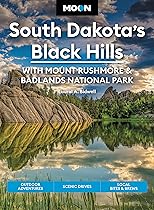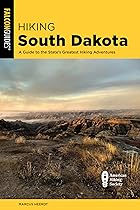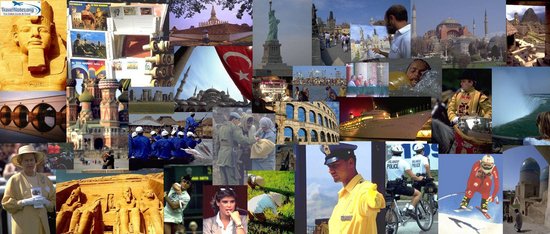Travel Notes: North America - United States - South Dakota Travel Notes.
Short URL: https://tnot.es/usSD
South Dakota Travel and Tourism on Travel Notes
South Dakota's Rich Cultural Heritage - A Journey Through Time
Delve into South Dakota's rich cultural heritage. Explore where history comes alive through captivating museums, Native American sites, and frontier towns. Share on Facebook
About South Dakota
South Dakota offers a wide range of attractions and activities for travellers, from iconic landmarks to outdoor adventures and rich cultural experiences.
States neighbouring South Dakota: Wyoming, Montana, North Dakota, Minnesota, Iowa and Nebraska.
 Add a Business -
Add a Location -
Add a Lodging - Add Travel Content
- Add URL
- Travel Services.
Add a Business -
Add a Location -
Add a Lodging - Add Travel Content
- Add URL
- Travel Services.
Mapping South Dakota
Map of South Dakota
Also known as Mount Rushmore State, South Dakota pays tribute to four American presidents - George Washington, Thomas Jefferson, Theodore Roosevelt, and Abraham Lincoln - in a giant mountain carving.
The Missouri River runs through the central part of South Dakota.
The state capital of South Dakota is Pierre, while its largest city is Sioux Falls.
South Dakota Overview
South Dakota is a state located in the Midwestern region of the United States, bordered by North Dakota to the north, Minnesota to the east, Iowa to the south-east, Nebraska to the south, Wyoming to the west, and Montana to the north-west.
Climate
South Dakota has a continental climate, characterised by cold winters and warm summers.
Weather patterns can vary significantly across the state, with the eastern regions experiencing more precipitation and the western regions being drier.
Economy
The economy of South Dakota is diverse, with industries such as agriculture, tourism, manufacturing, and healthcare playing significant roles.
Agriculture is particularly important, with the state being a major producer of corn, soybeans, wheat, and cattle.
Education
South Dakota is home to several institutions of higher education, including the University of South Dakota in Vermillion, South Dakota State University in Brookings, and Dakota State University in Madison.
History
South Dakota has a rich history, with indigenous peoples inhabiting the region for thousands of years before European settlers arrived.
The Lewis and Clark expedition explored parts of the area in the early 19th century.
South Dakota became a state on November 2nd, 1889.
Native American Influence
South Dakota has a significant Native American population, primarily consisting of Sioux tribes such as the Lakota, Dakota, and Nakota.
The Pine Ridge Indian Reservation and the Rosebud Indian Reservation are two of the largest reservations in the state.
Population
Although it has experienced some population growth in recent years, South Dakota remains one of the least populous states in the United States.
Tourism
South Dakota is home to several notable tourist attractions, including Mount Rushmore; the iconic monument featuring the faces of four U.S. presidents carved into the side of a mountain.
The state is also known for the Badlands National Park, the Black Hills, Crazy Horse Memorial, Custer State Park, and the historic city of Deadwood.
Visiting South Dakota - South Dakota Highlights
South Dakota is a beautiful state with a lot to offer visitors; from exploring iconic national monuments to immersing oneself in the natural beauty of its parks and landscapes.
South Dakota is a large state, so it is important to allow plenty of time to travel between different destinations.
The best time to visit South Dakota is in the spring (May-June) or fall (September-October), when the weather is mild and the crowds are smaller.
Be sure to pack for all types of weather, as the temperature can vary greatly depending on the time of year and location.
As a relatively rural state, South Dakota may have limited cell phone service and internet access in some areas; so don't rely solely on your mobile device for navigation and local travel updates.
Badlands National Park
Take a day trip to Badlands National Park, known for its dramatic landscapes, rugged terrain, and unique rock formations.
Explore the park's hiking trails, scenic overlooks, and wildlife viewing opportunities.
Consider joining a ranger-led program to learn more about the park's geology, history, and ecology.
Black Hills and Mount Rushmore
Explore the Black Hills region, starting with a visit to Mount Rushmore National Memorial, one of the most iconic landmarks in the United States.
Drive through the scenic Iron Mountain Road or Needles Highway for breath-taking views and unique rock formations.
Visit Crazy Horse Memorial, an ongoing mountain carving project honouring the legendary Lakota leader.
Spend the evening in Rapid City, exploring downtown or enjoying local cuisine.
Custer State Park and Wildlife Loop Road
Custer State Park is South Dakota's first and largest state park.
Drive the Wildlife Loop Road, where you can see bison herds, prairie dogs, deer, and other wildlife.
Visit Sylvan Lake for hiking, picnicking, or kayaking in a picturesque mountain setting.
Sioux Falls
As the largest city in South Dakota, a visit to Sioux Falls is almost a must.
If you only have time for one stop in Sioux Falls, it has to be Falls Park, where you can see the beautiful waterfalls on the Big Sioux River.
Visit the SculptureWalk, an outdoor art exhibit featuring sculptures from local and national artists displayed throughout downtown.
Pierre
Map of Pierre, South Dakota
Pierre, formerly the site of the the Arikara people's fortified capital, became the state capital when South Dakota entered the Union, in 1889.
Fort Pierre, across the river, was an early fur-trading post.
After you've photographed the State Capitol, the South Dakota Heritage Museum presents its visitors with historical, military, and Native American artefacts.
Nearby Lake Oahe is artificially created by the Oahe Dam; an important irrigation, power, and flood-control project on the Missouri River.
Where to Stay in Pierre, South Dakota.
Around South Dakota
South Dakota gets its name from the Dakota Sioux people.
The Missouri River runs through the middle of South Dakota, and the state's largest lakes - Lake Oahe, Lake Francis Case, and Lewis and Clark Lake - have all been created behind dams on it.
Early meetings between Native Americans and settlers seemed calm, although the Sioux were wary of the misuse of their lands.
Relations began to deteriorate once gold was discovered in the Black Hills and thousands more whites came in search of their fortunes.
Association
of South Dakota Museums:
Locate a member museum from the alphabetical listing with museum thumbnails.
South Dakota:
The official site of the South Dakota government.
Rapid City
Rapid City:
Founded in 1876 after the discovery of gold, Rapid City is still a mining centre and the
gateway to Mount Rushmore National Memorial, the Black Hills, and other scenic
attractions.
Mount Rushmore:
If a state lacks tourist dollars, then give them a National Memorial to come to. That
seems to be the reasoning behind carving a group of colossal busts in the granite face of
a mountain.
The massive sculptures - directed by Gutzon Borglum, between the First and Second World Wars - are of worthy American heads of state: George Washington, Thomas Jefferson, Abraham Lincoln, and Theodore Roosevelt.
Black Hills
The region is one of the richest gold-mining districts in the United States and contains a wide variety of other mineral resources including silver, lead, copper, tin, iron ore, coal, petroleum, salt, mica, and gypsum.
Black Hills National Forest:
The Black Hills were once part of a Sioux Native American reservation, but the US
government broke the 1868 treaty when gold was discovered in the region in 1874.
Black Hills
Tourist Info:
A state wide directory listing information about the Black Hills area of South Dakota.
Native Americans and The Sioux
Native American's influence upon the life and landscape of South Dakota can be seen through examples in the Sioux Indian Museum, in Rapid City.
The Dacotah Prairie Museum, in Aberdeen; W. H. Over Museum, at the University of South Dakota in Vermillion; and the Robinson Museum, in Pierre also exhibit art and artefacts of the state's Native American groups.
The Siouxland Heritage Museums, in Sioux Falls, also strive to preserve the region's past to serve visitors in the future, and there's plenty more historical reference material at the South Dakota State Historical Society.
Sioux Falls:
Founded in 1856, Sioux Falls had to be abandoned during the Sioux uprising of 1862, but
was resettled again a few years later once Fort Dakota was established.
Today's Sioux Falls is home to the Great Plains Zoo and Delbridge Museum of Natural History, and a memorial to the World War II battleship, USS South Dakota.
Badlands National Park:
Erosion over millions of years has produced a sight to see, and mere mortals added the
rest.
Crazy Horse Memorial:
There's enough rock around Black Hills, so why not spend half a century blasting out an 80
foot sculpture of a famous Native American too.
Custer
State Park:
July is mating season for the bison that remain in Custer State Park. A century ago, great
herds of American buffalo were grazing on the vast prairies of South Dakota - but man was
hungry too.
Custer State Park Resorts:
Within Custer State Park are four distinct resorts, each with it's own unique personality.
Outdoor activities designed to get you exploring every granite spire and brook-laden,
grassy meadow await you.
South Dakota Travel Guides
South Dakota Travel Guides - Maps.
About South Dakota - South Dakota
Weather:
Find out more about South Dakota before you travel there.
|
|
More From Travel Notes
Travel Notes Online Guide to Travel
Africa - Asia - Caribbean - Europe - Middle East - North America - Oceania - South America.
The Travel Notes Online Guide to Travel helps visitors plan their trip with country and city travel guides, local tourist information, reviewed web sites, and inspiring travel content.
Travel and Tourism Guides on Travel Notes
 If you find Travel Notes useful, please take a moment to
like us on Facebook and share with your friends on social media.
If you find Travel Notes useful, please take a moment to
like us on Facebook and share with your friends on social media.
Share on Facebook
Travel Resources
.
Travel & Tourism With Industry Professionals.














